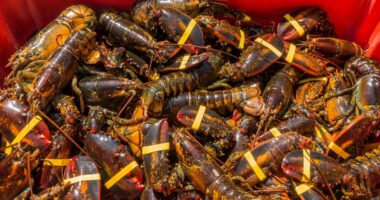Share this @internewscast.com
Recently, former President Donald Trump found himself in a surprising dispute with American cattle ranchers, a group that has traditionally been strong supporters of his agenda. This unusual confrontation arose as Trump addressed the rising cost of beef, which has surged by 14.7% over the past year. In an attempt to tackle this issue, he proposed importing more beef from Argentina without any tariffs, hoping this would help reduce prices.
Trump expressed his thoughts on social media, stating, “The Cattle Ranchers, who I love, don’t understand that the only reason they are doing so well, for the first time in decades, is because I put Tariffs on cattle coming into the United States, including a 50% Tariff on Brazil. They also have to get their prices down, because the consumer is a very big factor in my thinking, also!”
These remarks quickly ignited a wave of criticism across social media platforms, with many voices unified in opposition to Trump’s stance.
In a notable departure from Trump, several of his former officials and a group of 14 Republicans, led by Jason Smith, the House Ways & Means Chairman from Missouri, argued that increasing beef imports would “undermine American cattle producers.” They emphasized this point by highlighting how record-high beef imports in recent months have not resulted in lower prices but have instead contributed to a decline in U.S. cattle herds. This reduction in supply has, in turn, driven prices higher.
In one of the biggest breaks from Trump, former Trump officials and 14 Republicans led by House Ways & Means Chairman Jason Smith from Missouri said that importing more beef “undermines American cattle producers.” They’re right.
Importing beef is one of the reasons why we are in this mess. Beef imports have been at record highs in recent months, and it has never led to falling prices. It has led to declining herds in the U.S., though. Less supply means higher prices.
Weakening the Herd: Imports Make Cattle Ranching Less Attractive
The United States is importing record volumes of beef and veal — between 150,000 and 185,000 metric tons per month as of mid-2025. Record imports have not lowered prices.
This week, the Coalition for a Prosperous America (CPA), an advocacy group for domestic producers, including ranchers, said in a counter to Trump’s import push that rising imports have moved in lockstep with rising prices, the exact opposite of the Trump administration’s logic for reopening Argentine beef imports.

“Retail prices continue climbing even as domestic production collapses, proving that imports are not the solution,” said Andrew Rechenberg, one of CPA’s economists. “Imports cannot substitute for a healthy and expanding domestic herd.”
Each time prices rise, Washington turns abroad for a cheap, risky fix instead of signaling to local ranchers that we support their growth. This approach has hollowed out America’s cattle industry by allowing imports – mainly from New Zealand, Australia, Mexico, Canada, and Brazil – to replace U.S. ranchers. Our domestic herd has fallen to 86.7 million head — the smallest since 1951.
Meanwhile, the big multinational meat packers, of which two are Brazilian – JBS and National Beef – depress domestic prices by pitting American ranchers up against lower-cost beef from developing countries to force American ranchers to sell at unsustainable prices. These prices may be suitable to Mexican or Argentinian ranchers, but not American ranchers.
The “Lead Steer”: Multinationals Are Making a Mess
The “Big Ag” meat corporations are making a mess of the market.
Four companies dominate roughly 81-85 percent of the U.S. cattle market, giving them pricing power supremacy. If American ranchers don’t like the price, JBS will just import live cattle from Mexico or now beef from Argentina.
These guys are not ex-rancher cowboys who go to bull riding events and have a couple of Tennessee Walkers on their property. They might as well be a subprime mortgage-backed securities trader circa 2007.
In February 2025, JBS agreed to pay $83.5 million to settle a class-action antitrust suit alleging that it, along with Tyson, Cargill, and National Beef, colluded to suppress ranch-gate bids and inflate downstream margins — one of several ongoing cases documenting coordinated bidding, data-sharing, and output control across the sector.
Some ranchers are trying to go it alone, with direct-to-consumer models. Many of them are hobby farmers, making most of their money elsewhere. For those doing this as a full-time endeavor, expanding the herd is difficult for a few reasons: Investing in additional U.S. herd supply becomes less attractive if it has to compete with rising imports. Those who are able to and want to expand are often competing for land against corporate farms. Others have properties that cannot really be expanded by more than a couple of acres.
Also, independent ranchers using the direct-to-consumer model are not cheaper for consumers. They rely on smaller, independent meat packers. These guys are basically regulated into extinction by their home states. It is a wonder they can turn a profit.
One Vermont rancher told me that small processors often face higher compliance costs per unit of production than the large factory farms. This puts them at a competitive disadvantage and limits their ability to compete with the more consolidated meatpackers who have various business lines, compounding the meatpackers’ cartel-like power.
For a small meat processing facility, the real cost of regulations and compliance includes significant initial and ongoing financial outlays for food safety plans, facility and equipment upgrades, and laboratory testing. These direct expenses in the tens of thousands of dollars for each regulation are compounded by indirect costs, such as farm labor and the consultants you have to contract for audits each year for things like hazard analysis and sanitation standards.
American ranchers need both import relief and some regulatory relief for smaller players to make it attractive for independents to grow. Americans who don’t like factory farming, and are willing to pay extra for it, will have more options. Ranchers will have more buyers instead of the big four.
The U.S. used to be a net exporter of beef. We have been a net importer for at least three years.
The switch to imports was a decision pushed by the global meat packers. As a result, beef has become another item like health insurance, rent, and electricity bills that raise the cost of living. This higher cost of living issue is a huge headwind for Trump, and he knows it is. It is why he is trying to lower prices by flooding the U.S. with Argentine beef. Short term, it might work a little. Long-term, it only exacerbates the problems.
“The solution is to rebuild America’s cattle herd and restore sustainable ranching at home,” said Rechenberg, adding that Trump should establish a Section 232 tariff-rate quota on beef and cattle imports to protect American ranchers and make sanitary standards a national-security priority. One reason beef prices have risen is that the USDA, under pressure from independent ranch groups, agreed to ban live cattle imports from Mexico due to a screw worm infestation.
CPA also thinks Trump should enforce the Packers and Stockyards Act and antitrust law to curb collusion, require transparency in packer price setting, and allow the Department of Justice to go after these companies for anti-competitive practices.
These measures would create a genuine demand signal for American ranchers. It would give them the market clarity to invest and expand the herds instead of shrinking them, thanks to consistent import pressure.

















